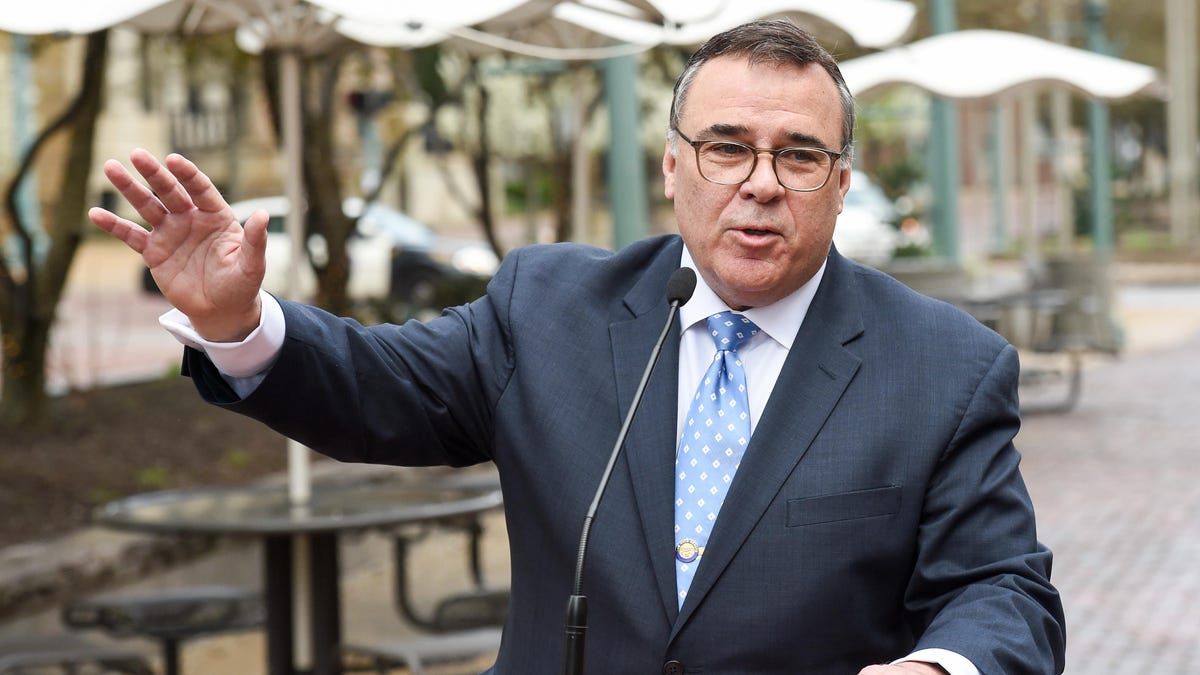Texas
Texas leaders want a new way to attract businesses here. But they can’t agree on how to do it.

Sign up for The Brief, The Texas Tribune’s daily newsletter that keeps readers up to speed on the most essential Texas news.
With Texas boasting more Fortune 500 company headquarters than any other state in the nation, the House and Senate appear motivated to pass an economic-incentive plan to continue attracting business and development to Texas school districts, and to replace a beleaguered 20-year program that expired last year.
The goal is to craft a tax-abatement bill to replace the old Texas Economic Development Act, known informally as Chapter 313, referring to the part of the state tax code that gave large businesses moving to Texas a 10-year discount on their school property taxes. The program was allowed to die in December after complaints it was little more than corporate welfare and that it created inequity in public school financing.
But the two chambers have 10 days to cut a deal before the end of the legislative session and the death of an incentive plan considered to be a priority for Republican state leaders.
And they are miles away from agreement on even the basics of a new program.
The Senate has yet to take a full vote on House Bill 5, the vehicle for the Chapter 313 replacement program. But the plan they’re considering — released by Senate Business and Commerce Chair Charles Schwertner, R-Georgetown, just minutes before opening public testimony on Thursday morning — differs greatly from the version by House State Affairs Chair Todd Hunter, R-Corpus Christi, that overwhelmingly passed in the lower chamber last week.
An agreement hinges on whether they can come together on these key points: how many jobs are required, how much companies would pay workers, whether companies can make side payments to schools in the agreements and which companies can participate.
If no agreement is reached, the state could go another two years without a tool that many business and political leaders say is vital to keep Texas competitive with other states. But opponents of the programs under consideration insist there is not enough oversight baked in and say the plans lack sufficient labor or environmental standards.
“This has been a divisive issue in the Legislature — amongst members on the left because of the concerns of the prior program causing inequity in our school districts, and on the right because of the concerns of essentially what we term corporate welfare,” Schwertner said. “I think the ears of every member … is open to how we come together with our colleagues in the House to establish an economic incentive program that is appropriate and tailored and a program that is right for Texas.”
Another conservative criticism of the defunct Chapter 313 program is that it was easily abused and gave renewables a leg up in a state that heavily relies on the oil and gas industry.
This session, the fights over the finer points of a new plan are pitting school districts against each other, causing disagreements between members of the same political parties, triggering tense moments between longtime Republican allies and the oil and gas industry, while also riling up the environmentalists and rural schools who support including renewable energy companies.
It was unclear Friday when Schwertner’s committee planned to vote on the measure and send it to the full chamber for a decision. The deadline for bill compromises is May 27.
The two chambers are starting with some common ground.
Both proposals allow companies to apply for a property tax discount in exchange for building and creating jobs in the school district that collects those taxes. The state would still fund the school for the taxes it would have collected without the discount. The program would be up for review in 10 years. Renewable energy companies were a major part of the Chapter 313 program for the past two decades but are cut out of both plans under consideration by lawmakers.
From there, the plans diverge.
The Senate version requires more jobs be created by eligible corporate participants as the House version does, and stipulates they have to be full-time positions but employees don’t have to be offered health insurance. The House voted to require health insurance and has a higher minimum pay than the Senate plan requires.
“We want new jobs, we want to win against other states, but we need to bring jobs that make sense to make the state better and move us forward,” said state Sen. José Menéndez, D-San Antonio.
Payments to schools
Then there’s the disagreement about how companies work with schools. Chief among the sticking points is whether companies should be allowed to make direct payments to schools as part of those deals, on top of the state dollars that supplement the property taxes.
The direct payments were included in the House bill but with limitations on what the schools could demand.
But the Senate version cuts out the companies’ direct payments to schools altogether.
Known by supporters as “payments in lieu of” taxes and by critics as “bribes” and “kickbacks,” the payments were a feature of the old program that detractors said created obvious inequities because only the districts lucky enough to win deals could get the windfalls.
Several of those districts, however, say the payments have been or would be critical to their survival, particularly those where student population growth is outpacing property values, rendering districts unable to shoulder the costs of growth.
Two years ago, the Taylor Independent School District struck a deal with Samsung to build in its Williamson County district, north of Austin. Even though the project isn’t up and running yet, the students have already benefited from 60 internships offered in a district where 70% of the student population has income low enough to qualify them for the district’s free lunch program, said Taylor ISD Superintendent Devin Padavil.
The direct payments made through the Samsung deal have already helped pay for facilities upgrades and repairs and teacher salaries without raising the tax rate, he said.
“If the state funding adequately allowed us to address teacher compensation and all of our other needs, that would be wonderful,” Padavil said.
Over the next 10 years, the payments from Samsung will total $46 million to the district, he said.
“But more than anything, this is about opportunities for kids,” Padavil told the Senate Business and Commerce Committee on Thursday. “The opportunities that our students have, that they can imagine for themselves, have expanded when a global corporation calls Taylor, Texas, its home.”
But state Sen. Lois Kolkhorst pointed out that some districts have dozens of those deals, like the 37 deals in the Barber Hill ISD northeast of Houston, while others, like Cuero ISD, have none.
The entire state would have benefited, she said, had that $46 million gone instead into the state’s school finance recapture program, which seeks to redistribute dollars more equitably between districts — but which also has its own critics who believe it is still unfair.
The Brenham Republican helped work on the original tax-discount program when it was created in 2001 but said Thursday that it had deteriorated over the years.
“I cannot believe Texas has not been sued over the inequities” created by the direct payments, she said. “No child in Tyler, Texas, should be worth more than the child in Amarillo, Texas, or the child in Brownsville or the child in Beaumont. …
“It really is good for you, and good for your children,” Kolkhorst told Padavil. “Love that. It’s just not the way the system was supposed to be designed.”
Who gets it
Many of the changes being considered by the Senate center on which companies would be allowed to take advantage of the abatement. Schwertner said his version of the bill seeks to narrow it to a smaller list of companies that would be eligible, mainly energy and technology related, such as desalination plants and semiconductor manufacturing. He added that an oversight committee created in the bill would be able to monitor the qualifications on an ongoing basis to keep the program “dynamic.”
“The bill as it came over was very, in my opinion, expansive relative to the prior 313 program,” Schwertner said. “It had supply chain, and national security aspects, and manufacturing that was very global, and anything over a billion dollars. So I took the opposite approach in this [version], in the sense that it would be more exclusionary.”
The Senate bill includes several provisions that limit which companies can make the deals, including banning those from countries that harbor terrorists or that are anti-Israel or anti-gun rights.
It also adds a requirement that the companies can’t be committed to environmental, social and governance — known as ESG — strategies that conservatives criticize as part of a leftist “woke” agenda with climate-change conscious policies that threaten the Texas oil and gas industry.
State leaders, in a fight led by Texas Comptroller Glenn Hegar, have railed and created laws against the state doing business with some of those companies.
Meanwhile, the Texas Oil and Gas Association is declining to fight the entry of those companies into the tax abatement program, saying the group prefers an “all the above” approach to energy policy.
State Sen. Robert Nichols, a Jacksonville Republican and a plastics manufacturing engineer, said that not allowing companies that use ESG strategies seemed exclusionary and “kind of hypocritical on our part.”
“If we’re going to prohibit companies that do ESG scores, we’ve pretty much wiped out consideration for everybody in the S&P 500. I think that’s a little too broad,” he said.
He pointed to a measure the Legislature sent to the governor on Thursday that would allow the Texas Parks and Wildlife Department to sell carbon credits through carbon sequestration, which brings dollars into the state but also helps corporations who buy them boost their ESG scores.
“So it’s kind of hypocritical on our part, if we take that approach, and I think it’d be very dangerous,” Nichols said.
The Senate version also closes a loophole in the House bill’s inclusion of grid projects that create more “dispatchable” power, that is power that can be turned on at any time and would include battery storage.
The House version could eventually open the door to wind and solar companies if they one day develop battery technology. But the Senate version specifies that the electric generation by those companies has to be “controlled primarily by forces under human control,” which excludes renewable energy sources like wind and solar.
The House has rejected that adjustment, voting down an effort by state Rep. Matt Schaefer, R-Tyler, to add a similar limitation during the House floor debate last week.
Schwertner defended his efforts to keep the plan from giving renewables an edge over companies that more clearly reflect “Texas values.”
“This is Texas, and Texas is Texas,” Schwertner said. “The ESG policies at various corporations should not interrupt our robust oil and gas economy here in Texas, and the deference to Texas values should be entertained. I stand for Texas. We should stand strong.”
Disclosure: Texas Parks And Wildlife Department has been a financial supporter of The Texas Tribune, a nonprofit, nonpartisan news organization that is funded in part by donations from members, foundations and corporate sponsors. Financial supporters play no role in the Tribune’s journalism. Find a complete list of them here.
We can’t wait to welcome you Sept. 21-23 to the 2023 Texas Tribune Festival, our multiday celebration of big, bold ideas about politics, public policy and the day’s news — all taking place just steps away from the Texas Capitol. When tickets go on sale in May, Tribune members will save big. Donate to join or renew today.

Texas
TCU Volleyball Dominates Texas Tech on Senior Night

A common theme for No. 22 TCU has been their complete dominance on their home floor this season. The Horned Frogs finished the year 14-1 at Schollmaier Arena. On Friday night, in front of over 3,000 fans, TCU swept Texas Tech (25-14, 26-24, 25-11).
The four seniors honored by TCU were Melanie Parra, Cecily Bramschreiber, Stephanie Young and Ashlyn Bourland. All four players found ways to contribute as Parra finished with 14 kills and seven digs. Bramschreiber filled up the stat sheet with four kills, four aces and seven digs. Both Young and Bourland got an ace.
Both teams traded points in the early going, but Bramschreiber sparked a 7-2 run to give the Frogs a 16-9 lead. TCU hit .417 in the first set and dominated the first set capped off by a Becca Kelley ace.
In set two, Texas Tech made things much closer jumping out to a 8-5 lead. A 4-0 run from TCU put them back in front. This set included multiple runs and it was Tech that got it to set point leading 24-22. TCU was able to end the set on a 4-0 run courtesy of kills from Jalyn Gibson and Parra paired with aces from Bramschreiber.
Trying to keeps things alive, TCU wasn’t met with much resistance from the Red Raiders in the third set. The Frogs kept up the pressure with multiple runs to build a massive 17-8 lead. Bourland picked up her first career ace and an attack error ended things.
It was a fun night for the seniors that played in front of the TCU crowd for the last time. The 14 wins at home tied the school record for most wins at home in a single season. They also picked up the most wins in a season since 2015. What Jason Williams has done for this program in such a short time has been remarkable to watch.
The Frogs move to 19-7 overall 11-5 in conference. They still are fifth in the Big 12 standings with two games to go. They will travel to Morgantown on Wednesday to take on West Virginia at 6 p.m. and then to Cincinnati on Friday at 1 p.m.
Want to join the discussion? Click here to become a member of the Killer Frogs message board community today!
Follow KillerFrogs on Twitter to stay up to date on all the latest TCU news! Follow KillerFrogs on Facebook and Instagram as well.
Texas
Texas AG sues Dallas for decriminalizing marijuana

Texas Attorney General Ken Paxton announced a lawsuit Thursday targeting the blue city of Dallas over a ballot measure that decriminalizes marijuana.
Paxton alleges that Proposition R, which “prohibits the Dallas Police Department from making arrests or issuing citations for marijuana possession or considering the odor of marijuana as probable cause for search or seizure,” violates state law.
The attorney general argues in the lawsuit that the ballot measure is preempted by Texas law, which criminalizes the possession and distribution of marijuana. Paxton also claims the Texas Constitution prohibits municipalities from adopting an ordinance that conflicts with laws enacted by the state legislature.
MORE AMERICANS SMOKE MARIJUANA DAILY THAN DRINK ALCOHOL, STUDY CLAIMS
Texas Attorney General Ken Paxton speaks outside the U.S. Supreme Court on November 01, 2021 in Washington, DC. (Drew Angerer/Getty Images)
“Cities cannot pick and choose which State laws they follow,” Paxton said in a statement. “The City of Dallas has no authority to override Texas drug laws or prohibit the police from enforcing them.”
Paxton called the ballot measure “a backdoor attempt to violate the Texas Constitution” and threatened to sue any other city that “tries to constrain police in this fashion.”
WHAT ARE THE TOP RISKS OF MARIJUANA USE?

A flower bud of marijuana. (AP Photo/Sakchai Lalit, File)
The lawsuit comes after interim Dallas Police Department Chief Michael Igo directed Dallas police officers not to enforce marijuana laws against those found to be in possession of less than 4 ounces.
Ground Game Texas, a progressive nonprofit group that campaigned in favor of the ballot measure, argued it would help “keep people out of jail for marijuana possession,” “reduce racially biased policing” and “save millions in public funding.”
TEXAS AG PAXTON FILES CRIMINAL REFERRAL AGAINST DOJ FROM ‘SUSPICIOUS DONATIONS’ THROUGH DEMOCRATIC GROUP

A mature marijuana plant begins to bloom under artificial lights at Loving Kindness Farms in Gardena, Calif., May 20, 2019. Paxton has sued the city of Dallas over a ballot measure that decriminalized possession of small amounts of marijuana. (AP Photo/Richard Vogel)
“It’s unfortunate but not surprising that Attorney General Ken Paxton has apparently chosen to waste everyone’s time and money by filing yet another baseless lawsuit against marijuana decriminalization,” said Catina Voellinger, executive director for Ground Game Texas.
“Judges in Travis and Hays counties have already dismissed identical lawsuits filed there. The Dallas Freedom Act was overwhelmingly approved by 67% of voters — this is democracy in action.”
CLICK HERE TO GET THE FOX NEWS APP
Since January 2024, Paxton has filed lawsuits against five Texas cities that decriminalized marijuana possession, arguing these policies promote crime, drug abuse and violence.
Texas
Tre Johnson, Texas Longhorns Scrape Past Saint Joseph’s to Win Legends Classic

The Texas Longhorns are heading back to Austin with some early-season tournament hardware in hand.
Tre Johnson battled through another poor shooting night but closed the game out for Texas once again, scoring a game-high 17 points to lead the Longhorns to a 67-58 win over Saint Joseph’s at the Legends Classic championship round in Brooklyn Friday night.
Transfer guard Julian Larry sparked the Longhorns late, scoring all 12 of his points in the second half. Arthur Kaluma added 14 points, four rebounds and four assists while Kadin Shedrick had 10 points and six rebounds.
The Hawks were led by Rasheer Fleming, who stuffed the stat sheet with 16 points, 20 rebounds, three assists, two blocks and three steals. Xzayvier Brown added 15 points on 4 of 7 shooting.
The Longhorns jumped out to an 11-6 lead after seven early points from Kaluma. St. Joe’s started out cold from the field but controlled the game with hard-nosed defense and the occasional press while dominating the offensive glass. This was highlighted by a possession where the Hawks got four consecutive offensive rebounds but only scored one point as a result.
Johnson stayed aggressive on offense for Texas but was off on his shot and was impacted by the on-ball defense of St. Joe’s.
Mark, Pope and Johnson all hit a triple for Texas in about a two-minute span ahead of halftime to give the Longhorns their biggest lead at 32-26 but the Hawks responded with a free throw from Haskins 3-pointer from Brown before halftime to cut the lead to 32-30.
The defense from the Hawks ramped up even more, as the Longhorns were stuck in the mud on offense and had little to no ball movement. St. Joe’s was hardly much better, but its defense continued to set the tone and eventually swung the momentum.
Larry then hit back-to-back triples as the two teams traded buckets on five straight possessions. Consecutive dunks from Ajogbor and Fleming but the Hawks in front 50-46 with 8:25 to play, but Larry continued to take over. He hit 1,000 career points with a driving layup before finding Kaluma for a corner triple to put Texas back in front at 51-50.
It didn’t stop there for Larry, who found a cutting Shedrick for a dunk before diving on a loose ball down at the other end to secure possession for Texas, which had built a 55-52 lead with 3:13 left. The Longhorns used the momentum to put together an 8-0 run, which essentially sealed the win in a game where scoring felt hard to come by.
Johnson then closed the game out with six points in the final 4:11 of action, including a pullup jumper at the foul line to put Texas up 63-55 with 1:19 left.
Texas will host Delaware State on Nov. 29.
Join the Community:
Subscribe to our YouTube Page HERE
You can follow us for future coverage by subscribing to our newsletter here. Also, be sure to like us on Facebook @LonghornsCountryOnSI & follow us on Twitter at @LonghornsSI
Other Texas Longhorns News:
MORE: Tramon Mark Injury Update: ‘He’s Close’ Says Texas Longhorns’ Rodney Terry
MORE: Tre Johnson Shines Again as Texas Longhorns Steamroll Chicago State
MORE: Texas Longhorns’ Tre Johnson Named SEC Freshman of The Week
MORE: Texas Basketball Finalist for Elite 5-Star Forward Koa Peat
MORE: Tre Johnson Recaps Texas Longhorns Debut: ‘Didn’t Faze Me’
-

 Business7 days ago
Business7 days agoColumn: Molly White's message for journalists going freelance — be ready for the pitfalls
-

 Science4 days ago
Science4 days agoTrump nominates Dr. Oz to head Medicare and Medicaid and help take on 'illness industrial complex'
-

 Politics6 days ago
Politics6 days agoTrump taps FCC member Brendan Carr to lead agency: 'Warrior for Free Speech'
-
/cdn.vox-cdn.com/uploads/chorus_asset/file/25739950/247386_Elon_Musk_Open_AI_CVirginia.jpg)
/cdn.vox-cdn.com/uploads/chorus_asset/file/25739950/247386_Elon_Musk_Open_AI_CVirginia.jpg) Technology5 days ago
Technology5 days agoInside Elon Musk’s messy breakup with OpenAI
-

 Lifestyle6 days ago
Lifestyle6 days agoSome in the U.S. farm industry are alarmed by Trump's embrace of RFK Jr. and tariffs
-

 World6 days ago
World6 days agoProtesters in Slovakia rally against Robert Fico’s populist government
-

 News6 days ago
News6 days agoThey disagree about a lot, but these singers figure out how to stay in harmony
-

 News6 days ago
News6 days agoGaetz-gate: Navigating the President-elect's most baffling Cabinet pick



















